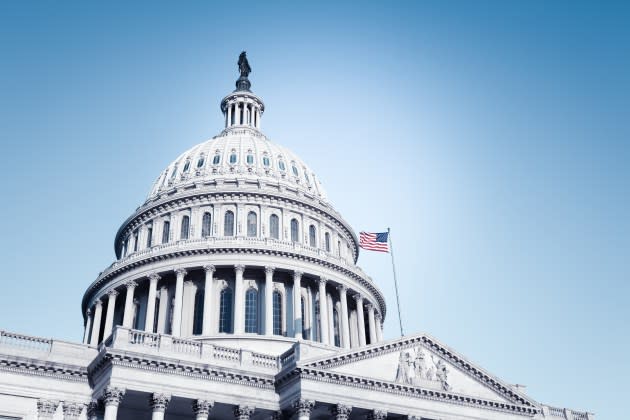Senate Judiciary Committee Advances Journalism Bill To Bolster Newspapers, TV Stations Despite Facebook Threat

The Senate Judiciary Committee revived the prospects for a long-proposed bill that would bolster print and broadcast news outlets in their negotiations with tech giants.
The Journalism Competition and Preservation Act cleared the Senate Judiciary Committee on Thursday in a 14-7 vote.
More from Deadline
Facebook Parent Meta Sells Giphy To Shutterstock For $53 Million Under Pressure From UK Regulator
Instagram Down: Social Media Platform Restored After Suffering Outage Worldwide
Linda Yaccarino Shares Reaction To Instagram's Twitter Competitor
The bill would create a “safe harbor” from antitrust laws for a period of six years years for newspapers, broadcast stations and digital journalism outlets, giving them more market power in the face of competition for advertising from Google and Facebook. If publishers are unable to come to terms with platforms on a deal for their content, an arbitrator would ultimately determine the rates.
Lawmakers who champion the legislation, led by Sen. Amy Klobuchar (D-MN) and Sen. John Kennedy (R-LA), say that it is needed in the face of the decline of local journalism, which has seen the scaling back of newsroom coverage and severe cuts in staffing.
But past attempts to pass the bill into law have stalled, most recently in December, when Facebook threatened “to consider removing news from our platform altogether” rather than “submit to government mandated negotiations that unfairly disregard any value we provide to news outlets through increased traffic and subscriptions.” The bill was left out of end-of-the-year defense legislation and never made it to the Senate floor.
A spokesperson for Meta, the parent company of Facebook, referred to the company’s past statements on the legislation.
Legislation also has been proposed in California to require platforms to pay news outlets monthly usage fees, representing a percentage of advertising revenue and determined through an arbitration process. Meta also said that if the bill passes, they would be forced to remove news from Facebook and Instagram “rather than pat into a slush fund that primarily benefits big out-of-state media companies under the guise of aiding California publishers.”
At the Senate Judiciary markup of the bill on Thursday, Klobuchar said that “despite all the fear mongering the internet did not break in Australia” when that country passed a law that required that platforms compensate publishers. Facebook briefly blocked news content before agreements were eventually reached with publishers.
Klobuchar said that the intent of the legislation is to ensure that “news organizations are able to negotiate on a level playing field.” She also said that there was greater urgency, as AI technology develops and scoops news content.
Kennedy said that the bill “is not about whether or not you like social media. This bill is not about whether or not you like what is happening in American news media today. This bill is about creative content, that is all it is about, and whether we respect creative content and value it, and whether we do not.”
But Sen. Alex Padilla (D-CA) voted against it, saying that his previous concerns over the legislation have not been addressed. He said that the bill is not tied to journalism jobs, citing the recent announcement by the Los Angeles Times that it would layoff more than 70 staffers. He called for assurances that the bill would ensure publishers would compensate newsroom workers from their gains, rather than the money going to “Wall Street dominated publishers” or to “reward shareholders.”
Klobuchar said that she would continue to work with Padilla on his concerns, while noting that the legislation is backed by content creators in the Authors Guild.
The bill also faces uncertain prospects in the House. One of its champions in the lower chamber, Rep. David Cicilline (D-RI), recently retired from Congress, while another sponsor, Rep. Ken Buck (R-CO), was bypassed to chair the House antitrust subcommittee in favor of Rep. Thomas Massie (R-KY), who has shown an aversion to government antitrust action to rein in big tech.
Sen. Mike Lee (R-UT), an opponent of the legislation, noted that House Speaker Kevin McCarthy had said that the bill was “dead in the House.” He was referring to an interview that McCarthy gave to Breitbart News last year, when he was still minority leader. Lee said that “aligning the media’s financial incentives with big tech” will “make them even more dependent on big tech.”
Klobuchar lamented that Congress has failed to pass not just the legislation, but other bills intended to curb the power of big tech. The bills stall in the face of opposition from certain members of both parties. “On the left or the right, it really doesn’t matter what. But what is the same? What does this all have in common? It helps the platforms, every single time.”
“If the answer is going to be, ‘My way or the highway,’ and the answer is always whatever big tech wants they get, then we aren’t going to advance this bill, let’s just be honest,” she said.
Best of Deadline
Hollywood & Media Deaths In 2023: Photo Gallery & Obituaries
2023 Premiere Dates For New & Returning Series On Broadcast, Cable & Streaming
Sign up for Deadline's Newsletter. For the latest news, follow us on Facebook, Twitter, and Instagram.

 Yahoo News
Yahoo News 